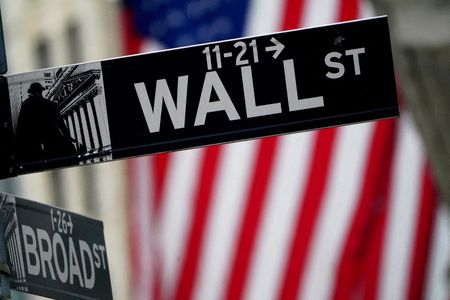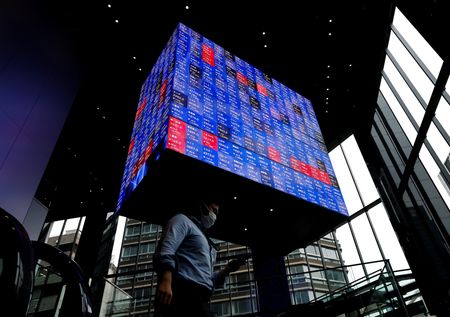 1
1 1
1



By Chris Prentice and Amanda Cooper
WASHINGTON/LONDON (Reuters) – U.S. shares extended last week’s rally and European shares climbed on Monday as signs of a cooling U.S. economy stoked hopes that the Federal Reserve will slow its pace of rate hikes.
The Dow Jones Industrial Average rose 1.34%, the S&P 500 gained 1.19% and the Nasdaq Composite added 0.86%.
The tech-heavy Nasdaq recovered after taking a hit from tumbling Tesla Inc shares and as traders awaited earnings in the coming days from Apple, Google parent Alphabet and Amazon.com.
U.S. business activity contracted for a fourth straight month in October, suggesting the Fed’s barrage of steep interest rate hikes is having the desired effect, raising hopes that the central bank could begin slowing the pace of increases to the Fed funds target rate.
“Investors are getting more confident that inflation is going to come down and that the Fed might be quick to pause,” said Edward Moya, senior market analyst at OANDA in New York. “The flash PMIs (purchasing managers index data) showed significant weakness across both the service and manufacturing parts of the economy, which is good news for investors expecting the Fed to pause early next year.”
The dollar weathered another suspected Japanese intervention to rise against the yen, advancing to 149.70 yen in early trade before retreating. Japan likely spent a record 5.4 trillion-5.5 trillion yen ($36.16 billion-$36.83 billion) in its yen-buying intervention last Friday, according to estimates by Tokyo money market brokerage firms. Japanese authorities did not confirm whether or not there had been intervention.
Sterling seesawed in volatile trade on news that Boris Johnson had dropped out of the running for British prime minister. Finance minister Rishi Sunak will become Britain’s next prime minister after he won the race to lead the Conservative Party, which could reduce some of the political uncertainty hanging over the pound.
Europe’s STOXX 600 index finished up 1.4% at its highest level in nearly a week, with utilities, media and travel and leisure sectors leading the gains. [.EU]
Markets are still priced for a rate rise of 75 basis points next month, but have scaled back bets on a matching move in December. The peak for rates has also edged down to around 4.87%, from above 5% early last week.
Fed officials indicated that the pace of tightening would be at the heart of any policy debate at November’s meeting.
Chinese blue chips slid almost 3%, while Hong Kong shares fell 6.4%, their biggest one-day drop since the financial crisis. The offshore yuan hit another record low against the dollar after Xi Jinping secured a precedent-breaking third leadership term, picking a top governing body stacked with loyalists. Xi is likely to stick to his zero-COVID policy that is damaging growth, analysts say.
Delayed data on gross domestic product (GDP) showed the Chinese economy grew 3.9% in the third quarter, above forecasts for 3.5%, but retail sales disappointed, with a rise of 2.5%.
Investors will get a look at U.S. GDP on Thursday and core inflation measures a day later. The economy is forecast to have grown an annualized 2.1% in the third quarter.
The European Central Bank meets this week and is widely expected to raise rates by 75 bps.
The euro last traded at $0.98640, having briefly been as high as $0.9899 early in the session.
The Bank of Canada is also expected to tighten by 75 bps at its meeting this week.
In treasury markets, traders shrugged off the slowdown in business activity data, staying concerned that the Fed would maintain its ultra-hawkish stance on fighting inflation. Yields climbed.[US/]
U.S. 10-year Treasury yields last traded at 4.2508%, off a 15-year peak of 4.337% on Friday.
In commodities, gold prices were under pressure from a firm dollar and the elevated U.S. bond yields. U.S. gold futures <GCv1 settled 0.1% lower at $1,654.10. Spot prices were down 0.4%.[GOL/]
Brent crude futures settled at $93.26 a barrel, down 0.3% and U.S. West Texas Intermediate crude finished down 0.6% at $84.58 data on lackluster demand from China and a stronger U.S. dollar. [O/R]
(Reporting by Chris Prentice in Washington and Amanda Cooper in London; Additional reporting by Amruta Khandekar, Devik Jain, and Wayne Cole; Editing by Nick Macfie, Will Dunham and Matthew Lewis)